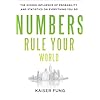Why do we go to Conferences?
Andrew pointed to a blog post on his blog, by Panos Ipeirotis who asked the question, why we do not use peer reviewing for conference talks in the same way we are used to it for journal papers.
His idea (which is not coming up the first time, and this year’s InfoVis worked pretty much this way) is to improve the overall quality of presentations, as we all have been sitting in boring or technically disastrous talks, which we would have liked to have seen improved.
As you can see from the image above, taken at the joint stat. computing and stat. graphics mixer at the 2009 JSM, I see a very important point of conference in the informal meetings around talks. Here is my comment on Andrew’s blog:
This idea might be interesting, but I think it totally misses the idea of oral presentations at conferences.
Conferences are for meeting people and exchanging ideas – that is what brings research forward. Having a reviewing process will destroy most of it.
What about being provocative and spontaneous? The reviewing would destroy all of this spice.
What is the point of a conference, which essentially gives us journal papers read aloud?





I approve of the idea – I don’t need to hear someone read their paper out, or simply read their bullet-pointed slides. I do want to hear things that’re outside the scope of the written paper but help me understand the work and its importance, presented in an engaging fashion.
I can’t see a good way of doing it though (maybe feedback afterwards from the chair of the session?), and some papers are always going to be much harder to present than others, particularly theory papers.
As an aside: if I were looking to delve into R for the first time, would your book be an appropriate place to start, or is there something else you’d recommend I look at first?
Rick,
as for your R question, I would recommend to search around the very many PDFs on the web, for which one matches your preferred style and the level of complexity you are willing to be exposed to. Once you know your basic steps in R, you will find it easy to find a book, which is worthwhile to spend the money for.